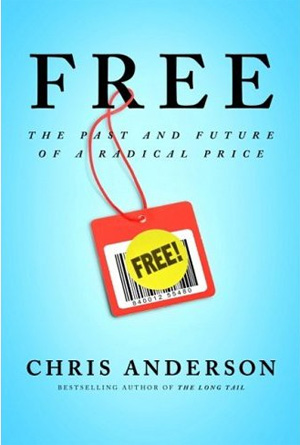Wired Magazine editor Chris Anderson has an important new book out, “Free: The Future of a Radical Price.” He focuses on the economics of free services, building on the excellent analysis of thinkers like Mike Masnick (whose 2007 essay, “The Grand Unified Theory on The Economics of Free,” succinctly sums up the concept).
Following up on his book, Anderson has a new op-ed up on CNN.com in which he explores how the emergence of free services in the digital age has raised new challenges for antitrust regulators:
Now Google has Microsoft-like dominance in search and search advertising. What should it not be allowed to do? That question may come to define this era of antitrust law. When [Christine] Varney was confirmed, she withdrew the Bush administration’s report setting relatively conservative standards of antitrust enforcement and declared, “The Antitrust Division will be aggressively pursuing cases where monopolists try to use their dominance in the marketplace to stifle competition and harm consumers…
Varney and her team of economists and lawyers are no doubt tangling with the question of how to enforce antitrust laws in a way that ensures an “even” playing field for competition without causing consumers to lose access to free services that are growing more abundant by the day.
But there’s a more important question that Varney should be asking: what actually constitutes market dominance in the age of free? Is the fact that a firm has a substantial share of a distinct marketplace a reliable indicator of dominance? And if the result of firms achieving high market share is an explosion of free goods and services, is it even in consumers’ interests for government to go after “dominant” firms?
Recent happenings in the tech world suggest that even markets often considered to be dominated by a single firm may be a lot more contestable than we think. Today’s hottest tech news item is that Google is “planning a direct attack” on Microsoft’s venerable Windows operating system. And just a few weeks ago, Microsoft launched its new search engine Bing, accompanied by a massive $100 million dollar advertising blitz.
Hold on a minute. Doesn’t Microsoft have a stranglehold of the operating system market? And isn’t Google in control of the search engine market? Antitrust regulators on both sides of the Atlantic certainly seem to think so, if recent investigations are any indicator.
Yet the top brass at Microsoft and Google must think otherwise, or else neither firm would be devoting such resources to breaking into the search and operating system markets, respectively. Rather than resting on their laurels, Microsoft and Google are competing aggressively, rolling out new and improved services all the time. Consumers are benefiting along the way — even from actions that are allegedly “anti-competitive,” such as Microsoft’s inclusion of bundled software with Windows or Google’s plan to digitize volumes of orphan works.
This dynamic is exactly the opposite of what one would expect from a market in need of “saving” by government trust-busters. In fact, despite Google’s 65% share of search and Microsoft’s 88% share of operating systems, both markets appear to be highly contestable.

 The Technology Liberation Front is the tech policy blog dedicated to keeping politicians' hands off the 'net and everything else related to technology.
The Technology Liberation Front is the tech policy blog dedicated to keeping politicians' hands off the 'net and everything else related to technology.